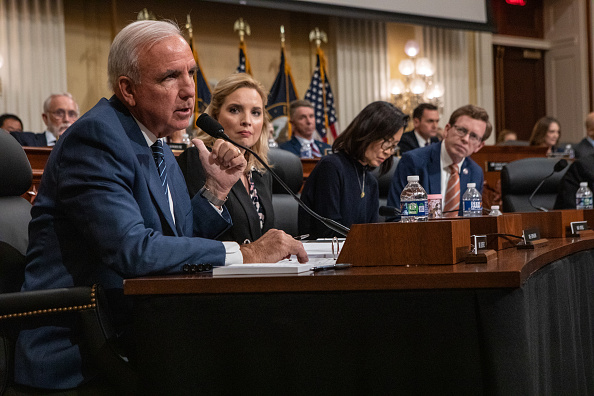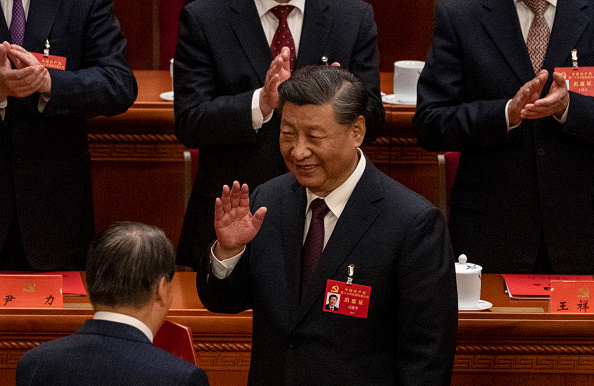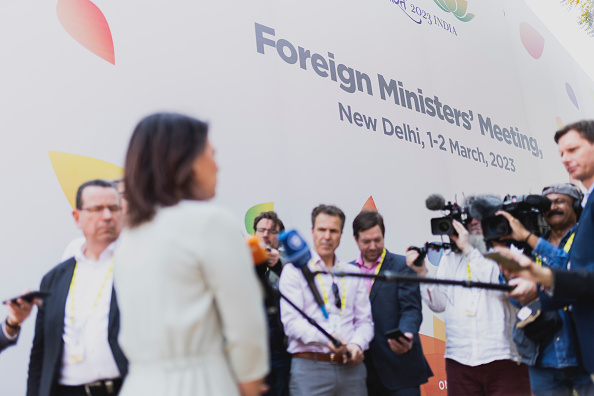
 "An Existential Struggle"
"An Existential Struggle"The Chinese Communist Party was a hot topic during the first hearing of the newly formed House select committee on China, with lawmakers on both sides of the aisle unified in calls to confront what they described as Beijing's efforts to divide Americans and undermine U.S. business interests and human rights values.
The panel's chairman, Republican Rep. Mike Gallagher of Wisconsin, described the bilateral relationship as "an existential struggle over what life will look like in the 21st century," and House Foreign Affairs Committee Chairman Michael McCaul said "there is no doubt that the growing aggression of the Chinese Communist Party poses a generational threat to the United States."
In a rare demonstration of unity across the aisle in Congress, lawmakers vowed to investigate numerous perceived technological, economic and military threats from the Chinese Communist Party.
Witnesses included two Trump White House officials — former national security adviser H.R. McMaster and former deputy national security adviser Matthew Pottinger, as well as Tong Yi, a Chinese human rights advocate who was an assistant to one of China's best-known political dissidents, and Scott Paul, the president of the Alliance for American Manufacturing. They highlighted the broad scope of Chinese influence and the strategies the U.S. may employ if it wants to retain its competitiveness in the global economy.
The House Financial Committee also approved ten bills that would allow the U.S. government to scrutinize financial institutions that serve senior Chinese officials, target Chinese manufacturing of synthetic drugs, and commission a Treasury Department report on the global economic risks associated with China's financial sector.
China responded to the eventful week of events by blasting the U.S. House committee, demanding its members "discard their ideological bias and zero-sum Cold War mentality."
The committee must "view China and China-U.S. relations in an objective and rational light," Foreign Ministry spokesperson Mao Ning said at a daily briefing.
Read more in "Find Areas of Agreement to Halt Collapse in U.S.-China Relations," by Doug Bandow, a Senior Fellow at the Cato Institute.
 It's That Time of Year Again
It's That Time of Year AgainChina's annual "two sessions" meetings are set to begin, with the 14th National Committee of the Chinese People's Political Consultative Conference (CPPCC), China's top advisory body, will start its first session on Saturday, and the 14th National People's Congress (NPC), the national legislature, will open its first annual session on Sunday.
At the NPC, Chinese President Xi Jinping is expected to address major issues facing the Chinese economy. Both development and security will be top priorities for this year's two sessions.
China is expected to set an economic growth target of above 5 per cent for 2023, hoping to restore business confidence in a post-pandemic China. In order to achieve this, authorities must overcome slowing demand for exports, rising geopolitical risk and property sector woes. Xi is predicted to stress the importance of boosting economic development, accelerating the establishment of a new development pattern and advancing Chinese modernization.
Before the two sessions officially kick off, the Central Committee of China's Communist Party concluded a three-day plenary session Tuesday, at which President Xi Jinping explained a draft plan for "reform" of the party and government institutions.
It said the world had entered a "new period of instability and change," hinting at a sense of alarm amid tensions with the U.S. over Taiwan and Ukraine.
State media announced that the plenum had confirmed the list of proposed candidates for senior government appointments. The new premier and senior financial and central bank positions are among expected announcements.
Xi loyalist Li Qiang, the former Shanghai party chief, is expected to ascend to the premiership. Li is already the Communist Party's No. 2, and would replace Premier Li Keqiang in Shanghai, a major financial hub.
Learn more in "China's Economic Growth and Future Under New Leadership," an interview with Lawrence Lau, prominent Hong Kong economist.
 A Heated Exchange
A Heated ExchangeForeign ministers from the world's largest economies met in New Delhi Thursday to discuss pressing global issues, including the Russia-Ukraine conflict, economic challenges posed by the war, and more.
Ultimately, heated exchanges over Russia's war in Ukraine dominated G20 talks, with host nation India saying the disagreements mean there will be no joint statement.
U.S. Secretary of State Antony Blinken said the meeting had been marred by Russia's "unprovoked and unjustified war."
While the gathering also came amidst increasing tensions between Washington and Beijing, Blinken didn't meet with China's Foreign Minister Qin Gang on the sidelines of the event. However, he defied expectations and met with Russian Foreign Minister Sergey Lavrov for the first time since the war in Ukraine began over a year ago. Blinken raised three key issues – the war, New START, and Whelan – though experts don't anticipate the meeting will lead to a breakthrough on key issues of tension in the near term.
At the meeting, Qin Gang also called on the members to conduct closer cooperation in enhancing multilateralism and promoting global development. He also emphasized consensus-building and globalization, and that members should work to deliver the outcomes of the G20 Bali Summit.
"We need to practice true multilateralism…," he said. "We need to promote the sound development of globalization, reject unilateralism, protectionism and attempts to decouple or sever supply chains, and ensure the stable and smooth operation of global industrial and supply chains," he said.
Analysts have also noted that Qin's remarks underline China's priorities for the global order.
Read more in "War in Ukraine, One Year On," by Sebastian Contin Trillo-Figueroa, a Fellow at Asia Global Institute, HKU.
Prepared by China-US Focus editorial teams in Hong Kong and New York, this weekly newsletter offers you snap shots of latest trends and developments emerging from China every week, while adding a dose of historical perspective.
- 2023-02-24 Opposing Worldviews
- 2023-02-17 Ripple Effects
- 2023-02-10 Ballooning Tensions
- 2023-02-03 Hot Air
- 2023-01-27 Spheres of Influence
- 2023-01-20 China's Davos Pitch
- 2023-01-13 Strategic Encounters
- 2023-01-06 Common Challenges
- 2022-12-23
- 2022-12-16 All in On Africa
- 2022-12-09 Seeking Stabilization
- 2022-12-02 Turf Tension
- 2022-11-18 Thawing Ties?
- 2022-11-11 Face to Face
- 2022-11-04 The Pacing Challenge
- 2022-10-28 Third Time’s the Charm
- 2022-10-21 United as Steel
- 2022-10-14 Party Time
- 2022-10-07 Elections Incoming
